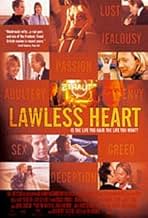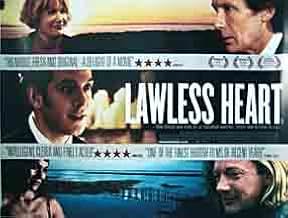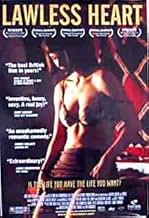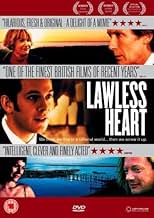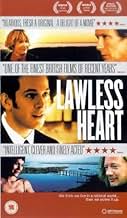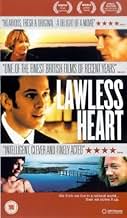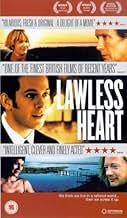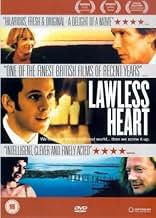IMDb RATING
6.6/10
1.5K
YOUR RATING
Three intersecting stories about people whose lives are affected by the death of a gay restaurateur.Three intersecting stories about people whose lives are affected by the death of a gay restaurateur.Three intersecting stories about people whose lives are affected by the death of a gay restaurateur.
- Directors
- Writers
- Stars
- Awards
- 9 wins & 7 nominations total
Hari Dhillon
- Will
- (as Hari Dillon)
- Directors
- Writers
- All cast & crew
- Production, box office & more at IMDbPro
Featured reviews
This is the kind of British film that they no longer make - a film that takes its time to reveal very real and complex characters and emotions. It is impossible to watch the film and not see aspects of your own life and relationships refracted through its characters. It's a film that leaves you feeling rewarded, stimulated and ultimately happy. British cinema deservedly has a poor reputation these days and the Film Council seems hell bent on funding films that it believes are going to be instant and obvious hits, rather than in investing in quality writing. Lawless Heart is where the future lies - a low budget film with big ideas.
This movie tells the same story from the viewpoint of three different people. The stories are presented in sequence and cover the same time span - the three characters are together in the first scene as well as several days later in the final scene. The event that brings them together in the first scene is the funeral reception for a man who was the brother-in-law of Dan (Bill Nighy), the lover of Nick (Tom Hollander), and the cousin and friend of Tim (Douglas Henshall). The plot structure is clever and works well. One of the challenges in telling a story in this manner that is effectively dealt with is to strike a balance in how much the characters interact - too little and the movie becomes three separate stories; too much and all the characters, as well as the viewers, know the whole story and there are no surprises. This plot structure is distinctly different from those of "Rashomon," where each character relates the same story with personal embellishments, or "Pulp Fiction," where the stories are only loosely intersecting and the time sequencing is not linear, or movies like "Lantana," which effectively utilizes flashbacks and interactions in real time among an ensemble of unrelated characters.
With each succeeding scene in each story we fill in pieces of the puzzle. The curious way people behave in one story is understood in a later story. For example, when Tim throws a party and invites a woman with whom he has just been enamored, she shows up only to hide behind a wall and ultimately escape the party by climbing over a fence. Tim is hard pressed to interpret this peculiar behavior and Dan, who witnesses the escape from outside the house, is mystified. How odd we think, but later we learn that a recent ex-lover of hers is there and she does not want an encounter with him.
We are made to think about how each of us sees only a small piece of the big picture. Each personal human encounter is the intersection of two worlds, the complex histories of which are fully known only by the individuals. People behave in ways that we find difficult to comprehend, but, in almost all situations, if we were to know the personal motivations and the full story, all would be understood.
To a great extent, the dialog carries the movie. When Dan is approached by an interested woman, Corrine, at the funeral reception and she asks him if he is depressed, he says, "How would I know?"
While the movie hangs together on first viewing, I found a second viewing to be rewarding. You pick up on a lot of things that would easily be missed on first viewing, like when Corrine invites Dan to dinner while checking out at the grocery store the cashier is a woman with whom Nick becomes involved.
The acting is polished and the multitude of songs on the soundtrack seem to have been chosen with care and they augment the story. It was uncharitable not to credit the Schubert piano trio that so effectively set the mood at the beginning and the end (Trio in E flat, Op. 100 D.929).
Altogether an engaging and skillful piece of film-making.
With each succeeding scene in each story we fill in pieces of the puzzle. The curious way people behave in one story is understood in a later story. For example, when Tim throws a party and invites a woman with whom he has just been enamored, she shows up only to hide behind a wall and ultimately escape the party by climbing over a fence. Tim is hard pressed to interpret this peculiar behavior and Dan, who witnesses the escape from outside the house, is mystified. How odd we think, but later we learn that a recent ex-lover of hers is there and she does not want an encounter with him.
We are made to think about how each of us sees only a small piece of the big picture. Each personal human encounter is the intersection of two worlds, the complex histories of which are fully known only by the individuals. People behave in ways that we find difficult to comprehend, but, in almost all situations, if we were to know the personal motivations and the full story, all would be understood.
To a great extent, the dialog carries the movie. When Dan is approached by an interested woman, Corrine, at the funeral reception and she asks him if he is depressed, he says, "How would I know?"
While the movie hangs together on first viewing, I found a second viewing to be rewarding. You pick up on a lot of things that would easily be missed on first viewing, like when Corrine invites Dan to dinner while checking out at the grocery store the cashier is a woman with whom Nick becomes involved.
The acting is polished and the multitude of songs on the soundtrack seem to have been chosen with care and they augment the story. It was uncharitable not to credit the Schubert piano trio that so effectively set the mood at the beginning and the end (Trio in E flat, Op. 100 D.929).
Altogether an engaging and skillful piece of film-making.
This was probably the finest film I saw last year. From its first scene, with the ever-so-English Bill Nighy, it was funny, sad and thought-provoking in equal measures. Nighy's turn as the confused, homophobic but well-meaning Dan was strong, and fully engaged our sympathies, but was trumped when we rewound and saw the same events as Nick (Tom Hollander). Hollander has a marvellous ability to show endless longing in a single eye movement - he's a remarkable actor and once again gave us a fully empathetic character. Sukie Smith, the opposite of his character, was clumsy but lovable as Charlie, and that segment felt almost self-contained.
When we rewound again to see Tim's viewpoint, I was a little disappointed. Tim had proved a horrible, selfish character, and I didn't fancy "being" him for any length of time. But Doug Henshall blew my mind in a performance that completely changed my view of his character and led to a moving and satisfying resolution.
In each of these men we are offered a different aspect of the Everyman. We learn that no-one is as they appear. Other laudable aspects are the uniformly strong supporting cast, the beautiful photography and music, but above all the little details. For example, Tim spooning sugar off the floor was genius. And in the restaurant when he makes a ring for Leah out of wire. And then the ashtray catches fire. Also, spot Corrine's dinner party in the background as Dan drives past. Look out for as many of these as possible! This is a film in which every detail is thought through, and it contributes for a cinematically enriching experience. SEE IT.
When we rewound again to see Tim's viewpoint, I was a little disappointed. Tim had proved a horrible, selfish character, and I didn't fancy "being" him for any length of time. But Doug Henshall blew my mind in a performance that completely changed my view of his character and led to a moving and satisfying resolution.
In each of these men we are offered a different aspect of the Everyman. We learn that no-one is as they appear. Other laudable aspects are the uniformly strong supporting cast, the beautiful photography and music, but above all the little details. For example, Tim spooning sugar off the floor was genius. And in the restaurant when he makes a ring for Leah out of wire. And then the ashtray catches fire. Also, spot Corrine's dinner party in the background as Dan drives past. Look out for as many of these as possible! This is a film in which every detail is thought through, and it contributes for a cinematically enriching experience. SEE IT.
A thoughtful, eloquent and compelling story of smalltown people wrestling with big time problems. This is a truly engaging movie - somehow realist and magical at the same time, that shows that British films don't have to feature Hugh Grant or crass cockney stereotypes. The dialogue is sharp, the acting competent if a little measured at times and you find yourself caring about how things will turn out even for characters you don't actually like that much.. I'm a friend of one of the directors in case anyone shouts bias, but I genuinely liked this movie and I'd recommend giving it a try.
I'd been waiting for ages to see this film, ever since I read about the making of it in January 2001. It's been a long wait since the London premier in November to it's recent general release. However it was well worth the wait. I liked the way that the film told the story from three different points of view. It was interesting how sometimes when you thought there were only two people in the scene first time,eventually you saw there were actually three or four. I was moved by Tom Hollander's performance as Nick trying to come to terms with his grief. I laughed and cried with Tim, A brilliant performance by Douglas Henshall. My only criticism of the film was Tim's parents. We only see them in a few scenes, but neither of them is like him. You would expect at least one of them to enjoy a 'right old knees up', or you would expect them to be kind salt of the earth types, instead they are portrayed as cold and indifferent. A lot of film critics have described Tom as the returning prodigal son, if he had been then his parents would have had the party for him, he wouldn't have had to organize his own. That aside I loved all of the other characters and the way they were portrayed. I don't think that anyone who has lost a friend or loved one could fail to be moved by the final scene. On the whole this is a wonderful British film.
Did you know
- Crazy creditsSpecial thanks to ... all at Casarotta ... the residents of Maldon, Essex and the Isle of Man.
- ConnectionsReferenced in Film Geek (2005)
- SoundtracksI Can't Help Myself
(1998)
Written by Mark Hadfield, Adam Ryan-Carter
Published by Sony/ATV Music Publishing
Performed by Lucid
Licensed courtesy of Warner Strategic Marketing UK and 1999 Delicious Records Ltd
Details
- Release date
- Countries of origin
- Official sites
- Language
- Also known as
- Corazones desenfrenados
- Filming locations
- Production companies
- See more company credits at IMDbPro
Box office
- Gross US & Canada
- $330,067
- Opening weekend US & Canada
- $15,544
- Feb 23, 2003
- Gross worldwide
- $539,596
Contribute to this page
Suggest an edit or add missing content



